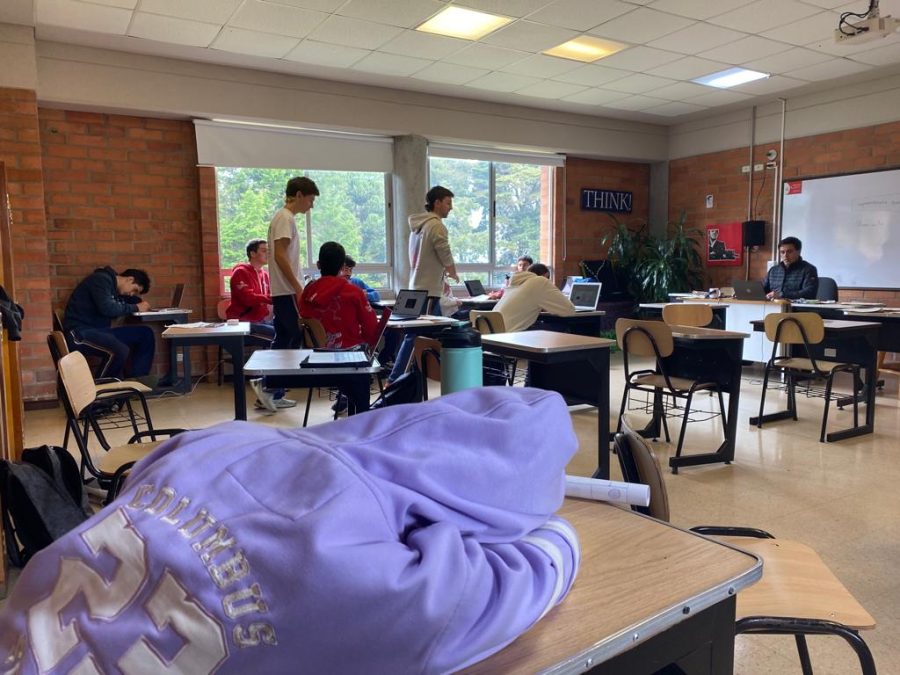The Battle for Mental Health
The four-cornered room is completely dark, and the night’s silence is so intense that it can cut through everything. You try to close your eyes, but the bright computer screen in front of you keeps you from doing so. You look at the clock. It’s 1:47 in the morning. Sighing, you look back to your computer and force yourself to complete the project that was due two days ago.
Poor mental health is a growing concern among students, affecting their academic performance and overall well-being. With the COVID-19 pandemic, these challenges forced students to cope with several stressors, such as social isolation and academic pressure. After spending a lot of time online, students had to change their study habits when they returned to traditional classes. Their mental health, social skills, and academic performance all suffered as a result.
“I felt socially isolated and anxious about being around so many people again. It definitely impacted my mental health and my ability to focus on my studies,” Senior Maria Adelaida Restrepo said.
Students face a variety of mental health challenges
Mental health issues are a common concern for students, with anxiety and depression being two of the most seen. These mental health conditions can have a significant impact on academic performance and lead to procrastination. Anxiety can cause excessive worry and stress, which can make it difficult for students to concentrate and retain information. This will also cause students to avoid starting to study to delay the stress that studying causes them, and eventually become overloaded with work and have less time to complete it.
“Procrastination is not fun at all, it’s like being stuck in a loop and as much as you try to stop it and start working your mind betrays you and convinces you to leave it for later,” Senior Paulina Alvarez said.
Depression can lead to feelings such as low energy, making it hard for students to stay motivated and engaged in their studies. Both anxiety and depression can affect sleep patterns and impact students’ academic performance.
Even though many schools offer help for students such as counseling services and support groups, these opportunities tend to go ignored since students do not use them as they ought to. One of the reasons students do not use these resources or share their feelings is because they are afraid that information shared in these safe spaces could be revealed to family members or other people.
“I have heard from a lot of students that they fear to reach out thinking they will be told that it’s just a phase or that they only do it for attention,” Senior Maria Jaramillo said.
The impact of poor mental health on academic performance
Low grades, incomplete assignments, and difficulty concentrating are all issues that can have a negative impact on a student’s academic performance. These challenges can be caused by a variety of factors, such as stress, lack of motivation, and mental health issues. When a student struggles with these problems, it can be difficult to stay at the top of their performance, leading to lower grades and incomplete assignments. Difficulty concentrating can also eventually lead to a lack of focus on lectures, instructions, and other important information.
“I’m very flexible with the work we do in class, many students often struggle because of personal reasons and I understand if they feel they will be more productive at home than in class,” Felipe Naranjo, AP Psychology Teacher, said.
Many students changed their study habits, such as studying earlier, creating a routine, and eliminating distractions while studying like social media, friends and TV. This is in order to improve their concentration and academic performance, by taking little steps to change this issue.
“In the pandemic, I was able to complete more work, but when we came back, there was a time when I was finishing homework late at night, for me it’s still very hard to concentrate due to the loads of work and very little time,” Senior Sofia Soto said.
Support is available
Academic pressure, stress, and social isolation are common issues experienced by students, especially by those who pursue academic programs or face high expectations from their families. Social isolation, on the other hand, can lead to feelings of loneliness and disconnect from the academic community, which can make it challenging for students to engage in their studies. These issues can have a significant impact on a student’s mental and physical health, as well as their academic performance. To address these issues, students may seek support from their peers, academic advisors, or mental health professionals.
“In general, grades negatively impact the mental health of anyone, students feel measured by their grades they put all their effort for just a number, instead of the effort in learning,” Camilo Hoyos, ISC Teacher, said.
Finding ways to manage stress, such as mindfulness techniques or exercise, can also help students cope with academic pressure and social isolation. By prioritizing their mental health and seeking support when needed, students can better manage academic stressors and achieve success in their studies.
“We should never feel ashamed or embarrassed to address our mental health struggles, it’s a common issue that affects many of us,” Senior Emilio Ospina said.




